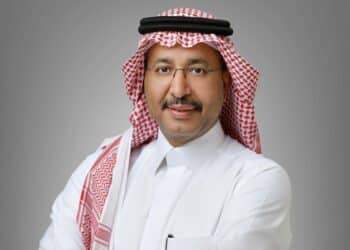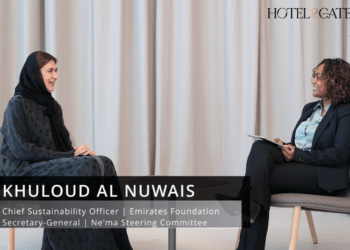With Saudi Arabia boasting the most active pipeline in the Middle East and religious tourism worth $145 billion in 2014, Hotel News ME hears from the experts on the ground as to how the market is evolving to meet supply and demand of domestic and foreign travellers plus how the Saudi Commission for Tourism and National Heritage is stimulating demand for the region.
The experts:
Kevin Brett, cluster general manager of Jeddah Hilton and Waldorf Astoria Jeddah, Qasr Al Sharq
Basel Talal, general manager of Radisson Blu Hotel, Riyadh and district director of The Rezidor Hotel Group in Saudi Arabia
Mohamad Haj Hassan, area vice president Saudi Arabia, Sudan, Egypt, Iraq, Kuwait, Qatar, Jordan and Bahrain
How is your hotel performing in Saudi and what factors are driving demand?
Lippuner: Four Seasons Hotel Riyadh at Kingdom Centre aims to be an

industry leader in the city. People are really buying the service that goes hand in hand with the Four Seasons brand.
Some of the other factors that are driving demand are: Convenience: Our guests are clear on their expectations and wish very simply for an easy and worry-free stay. Ensuring every convenience for them is key – location, great technology and connectivity, state-of-the-art facilities and equipment in the Health Club and Spa. Intuitive connections: We are always a step ahead of our guests and striving to understand their individual needs and anticipating them before they ask for them.
Added value: Guests in general are very connected to value additions in any hospitality environment. Whether it’s a free coffee or pastry, an open mini-bar or free movie – the small tangible opportunities create and support a loyal following.
Hassan: Al Marwa Rayhaan by Rotana, Makkah, is driven by religious tourism which is in high demand throughout the year but especially during the holy month of Ramadan, Hajj and Umrah seasons.
Our upcoming property, the 5-star Rosh Rayhaan by Rotana, Riyadh, is expected to open in Q1 2016 and will be targeting business travellers and corporate clients. The hotel’s demand is highly driven by the tremendous work the government have put into its infrastructure and internal development, such as the expansion of KKIA airport, local airlines wide network, the Riyadh Metro and King Abdullah Financial District. Additionally, all of the major economical, medical and political conferences and summits which the country has been hosting play a main factor in driving demand towards the country as a destination.
Religious tourism and domestic tourism accounts for more than 65% of passenger traffic in Saudi Arabia, is supported by the high purchasing power of local consumers and the government’s efforts to promote the Kingdom as one of the leading tourist destinations in the Middle East, in addition to the great importance of the two holy mosques in the hearts of Muslims around the world.

Brett: At our Jeddah Hilton and Waldorf Astoria Jeddah, Qasr Al Sharq we are continuing to see strong performance across all business segments, with occupancy levels performing very well in our local market. The infrastructure projects and the various initiatives undertaken by the local authorities to promote tourism have contributed to driving demand. The Jeddah hospitality market is driven by two factors; it is predominantly a corporate-based market, and there is also demand from domestic tourism.
Within the corporate segment, meetings, conferences and events (MICE) make up the bulk. Much of the MICE business is generated through government-related activities with a welcome boost over the summer as the government relocates from Riyadh to Jeddah. And of course, the Jeddah Hilton has an outstandingly good reputation in the Kingdom for excellence in hosting large conferences and weddings.
Talal: Radisson Blu Hotel, Riyadh is doing well with a healthy demand this year especially in meetings and events and specifically with banquets and weddings. Our 12 meeting rooms are fully active hosting corporate and private functions and the Al Mubarakiah Ballroom is in constant demand for weddings and Iftar parties.
What challenges do your properties face as more hotels open their doors in Saudi?
Brett: Jeddah continues to see significant investment in travel and the hospitality industry, with hotel room supply set to increase over the coming years. With our strong reputation and the performance advantage of Hilton Worldwide we welcome further investment in the city, in terms of business and visitor infrastructure. We are confident in remaining first choice for business and leisure visitors, owing to our unrivalled levels of service and the benefits of being part of Hilton Worldwide.
Hassan: The increase of four and five-star hotels in the country is expected to rise to almost 5,000 room keys by 2016. This might cause a few challenges for our upcoming properties in terms of the share of corporate and retail clients. However, the Saudi hospitality market is still growing and there is always room for developments and expansions, in fact, the increasing number of hotels in the country assists in improving the reputation as a destination and conveys that it is going in the right direction.
We look forward to acquiring a large share of that market and expanding into different regions of the country. Rotana has ambitious plans for expansion in the Saudi market. We intend to add more than 1,500 rooms and suites through the opening of six new hotels in Riyadh, Jeddah, Al Khobar and Dammam, including four hotels branded Centro by Rotana. These four will be termed economy hotels and so this move is a part of our plan to expand our presence in the local market.
Talal: Riyadh city is currently affected by the ongoing construction work

of Riyadh Metro project which has a knock on effect for the surrounding hotels. Also the business visit visa application process limits the hotel’s capacity to host international events and meetings. Yet, every year the capital is witnessing new hotel openings and this is a worthy indicator of the city’s development and ongoing investors’ trust in the Saudi economy.
We have signed a number hotels in several of the Kingdom’s cities, including Riyadh, to meet the ever increasing business demand of the international and local business travellers.
Normally the increase of supply is based on future forecasted business and we believe that demand for accommodation in Riyadh will increase year on year thanks to the development of mega city projects and the thriving MICE market.
 Lippuner: It’s no secret that there is more competition now than ever in Saudi Arabia and we believe that for hotels to keep up with the developing sector, they should work on differentiating themselves not only with the product that they are offering but also by customising the guest experience, to truly understand their needs and to deliver a memorable experience at all levels. At Four Seasons Hotel Riyadh, our goal is to be the first and only choice for GCC travellers and we expect to accomplish this by ensuring that we not only anticipate the needs of our guests but also develop programs and services to consistently exceed their expectations.
Lippuner: It’s no secret that there is more competition now than ever in Saudi Arabia and we believe that for hotels to keep up with the developing sector, they should work on differentiating themselves not only with the product that they are offering but also by customising the guest experience, to truly understand their needs and to deliver a memorable experience at all levels. At Four Seasons Hotel Riyadh, our goal is to be the first and only choice for GCC travellers and we expect to accomplish this by ensuring that we not only anticipate the needs of our guests but also develop programs and services to consistently exceed their expectations.
What steps are you taking to generate repeat business from current source markets?
Hassan: Apart from the obvious element of providing excellent service, unique hospitality and a comfortable stay, our loyalty programme Rotana Rewards is where we spend a huge amount of our focus in retaining clients and encouraging repeat business.
Our rewards program members enjoy exclusive perks and privileges that will make staying and dining at Rotana more fulfilling. Guests can earn points with every meal or stay at any Rotana hotel, and redeem these points from a wide selection of rewards with special discounts and benefits.
Lippuner: We are always on the lookout for new opportunities to retain our current portfolio of guests, as well as finding fresh ways to attract new target markets. The location of the hotel in the centre of the city plus the elegant furnishings which give thoughtful consideration to the needs of the business guest and close attention paid to advanced technological amenities all contribute to making Four Seasons Hotel Riyadh a destination of choice for executive travellers.
We have also elevated our commitment to providing our female clientele with a level of service that goes beyond the expected by creating a ladies-only floor “The Pearl” to help female guests feel more comfortable and secure whilst travelling to Riyadh. The floor which is fitted out with 18 superior rooms, two deluxe rooms and two Four Seasons executive suites feature an express check-in desk, a ladies-only lounge and state-of-the-art ladies’ gym.
Talal: We strongly believe in the importance of digital communications and Radisson Blu Hotel, Riyadh recently launched the Radisson Blu One Touch App to the market. This App enables the guest to search for our hotels around the world and engage with our own hotel’s services through highly interactive menus. Equally important is the need to stay competitive and this we do through the renovation and upkeep of our rooms and public facilities.
Brett: Hilton’s portfolio of brands are well placed to benefit from the company’s strong reputation and global performance advantage, with programs such as Hilton HHonors which has more than 45 million loyal members – generating demand for occupancy across the world. This coupled with our priority of providing professional and consistently unfailing service is an absolutely essential component in the hotel industry to bring back repeat business.
What new source markets should hotels in Saudi be tapping into and why?
Lippuner: Saudi Arabia has witnessed vast growth in both the hospitality industry and in tourism, creating more opportunities for family activities, cultural attractions, hotels, restaurants, and many alternatives for entertainment, all at higher standards than before to support the country in becoming a central destination for tourists. This has simultaneously encouraged hotels to tap into the family market which is currently on the rise so hotels need to gear towards the requirements of families travelling to the region.
Hassan: Right now, retail and corporate segments remain top players in Saudi markets, however, the government is placing more emphasis on tourism and hospitality whilst exploring its potential to develop as a key touristic destination outside of its already buoyant religious tourism. The Kingdom’s heritage of nature and archaeological sites have the potential to attract more visitors when the travel and hospitality infrastructure are appropriately developed alongside tourist visa improvements.
Domestic tourism is also a significant opportunity for Saudi Arabia. The government is committed to increasing this market to capture some of the capital spent by the large number of Saudi residents travelling abroad each year.
Rotana will work in the coming years to promote the concept of economy hotels to the region, as the idea is still relatively new here. We will work to provide great accommodation at convenient prices to suit different segments of the market, whether people are visiting for business or leisure and at the same time, provide services that meet the highest standards of hospitality.
Brett: Jeddah is arguably the most important leisure destination in Saudi Arabia, and our leisure guests are mostly from within the Kingdom. In comparison, Makkah and Madinah benefit from religious tourism, with millions of pilgrims coming from all over the world. Religious tourism is expected to continue to flourish as the Kingdom completes the expansion of the two holy mosques. To meet the growing demand in the two holy cities, the government is investing considerably in developing the infrastructure mainly related to transport, such as the high speed rail and metro projects in Makkah, as well as the expansion of Prince Mohammed Bin Abdulaziz Airport in Madinah. These projects are expected to bring spin-off benefits to Jeddah. With regard to the new source markets for Jeddah, the Saudi government is planning to open up tourist visas within the next couple of years.
Talal: Riyadh is the main feeder market for KSA hotels. However, there are a number of mega projects in other cities including Jeddah, Jizan, Yanbu, Jubail which require accommodation and which is a valuable source of business for hotels. Saudi Arabia remains a major host for oil and gas companies from the European Union and the USA and regularly attracts business travellers from the GCC and Levant. Hotels operating in leisure destinations the focus needs to shift more towards the key markets of India and China as Saudi Arabia has many sites that could offer a totally new experience for these travellers.
How can hotels work more closely together and with the Saudi Commission for Tourism and National Heritage to stimulate demand?
Talal: We work very closely with the Saudi Commission for Tourism and National Heritage but I believe that we could do better sharing best practices from abroad to help develop the hospitality industry and stimulate greater demand. Most of the operating hotels in the Kingdom are from international brands operating in multiple cities and it is very common for us to bring new ideas to SCTH yet the main challenge remains in applying new ideas which may not always be compatible with the conservative Saudi market.
Lippuner: With continuous efforts from the Saudi Commission for Tourism and Antiquities to develop the country’s cultural tourism, the Kingdom is certainly set to become a destination for domestic and international visitors. We as a hotel, have been very active with the Saudi Commission for Tourism and Antiquities, by participating the activities that have been initiated by them including the Riyadh Summer Festival, Riyadh Food Festival and more recently the FSRiyadh Love Instagram Contest, a photo contest which played an important role in helping promote the city both locally and internationally. All of these collaborations with the Saudi Commission for Tourism and Antiquities come as part of our ongoing commitment to help promote Saudi Arabia not only as a business destination, but also as a tourism destination thus stimulating more demand.
Brett: The Saudi Commission for Tourism and National Heritage is doing its best to take tourism to the next level. However, we need to work more closely with each other to come up with a busy year-round calendar of activities, attractions and events that can leverage the demand for the additional capacity of the new hotels being built in Jeddah. The private sector also has an opportunity to invest in touristic parks and attractions. This will provide a much needed catalyst to drive business and to create a positive image, and to increase the city’s brand recognition and its share in tourism. However, this requires careful planning and a collaborative approach. The initiatives undertaken to improve the landscape of the Jeddah Corniche reflect the Kingdom’s desire to improve the tourism sector and to attract more tourists to the city.



































































